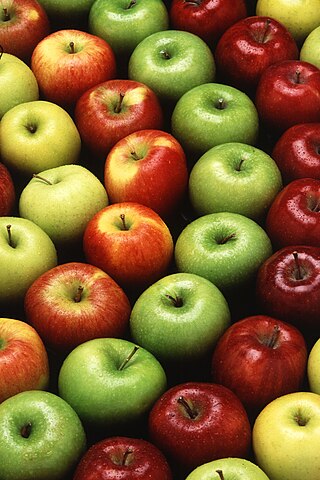Dieting is the practice of eating food in a regulated way to decrease, maintain, or increase body weight, or to prevent and treat diseases such as diabetes and obesity. As weight loss depends on calorie intake, different kinds of calorie-reduced diets, such as those emphasising particular macronutrients, have been shown to be no more effective than one another. As weight regain is common, diet success is best predicted by long-term adherence. Regardless, the outcome of a diet can vary widely depending on the individual.

The Atkins diet is a low-carbohydrate fad diet devised by Robert Atkins in the 1970s, marketed with claims that carbohydrate restriction is crucial to weight loss and that the diet offered "a high calorie way to stay thin forever".
Food energy is chemical energy that animals derive from their food to sustain their metabolism, including their muscular activity.

A food pyramid is a representation of the optimal number of servings to be eaten each day from each of the basic food groups. The first pyramid was published in Sweden in 1974. The 1992 pyramid introduced by the United States Department of Agriculture (USDA) was called the "Food Guide Pyramid" or "Eating Right Pyramid". It was updated in 2005 to "MyPyramid", and then it was replaced by "MyPlate" in 2011.

The Paleolithic diet, Paleo diet, caveman diet, or Stone Age diet is a modern fad diet consisting of foods thought by its proponents to mirror those eaten by humans during the Paleolithic era.

The Scarsdale diet, a high-protein low-carbohydrate fad diet designed for weight loss, created in the 1970s by Herman Tarnower and named for the town in New York where he practiced cardiology, is described in the book The Complete Scarsdale Medical Diet Plus Dr. Tarnower's Lifetime Keep-Slim Program. Tarnower wrote the book together with self-help author Samm Sinclair Baker.

A fad diet is a diet that is popular, generally only for a short time, similar to fads in fashion, without being a standard scientific dietary recommendation, and often making unreasonable claims for fast weight loss or health improvements; as such it is often considered a type of pseudoscientific diet. Fad diets are usually not supported by clinical research and their health recommendations are not peer-reviewed, thus they often make unsubstantiated statements about health and disease.

Low-carbohydrate diets restrict carbohydrate consumption relative to the average diet. Foods high in carbohydrates are limited, and replaced with foods containing a higher percentage of fat and protein, as well as low carbohydrate foods.

The Mediterranean diet is a diet inspired by the eating habits and traditional food typical of southern Spain, southern Italy, and Crete, and formulated in the early 1960s. It is distinct from Mediterranean cuisine, which covers the actual cuisines of the Mediterranean countries, and from the Atlantic diet of northwestern Spain and Portugal. While inspired by a specific time and place, the "Mediterranean diet" was later refined based on the results of multiple scientific studies.

In nutrition, diet is the sum of food consumed by a person or other organism. The word diet often implies the use of specific intake of nutrition for health or weight-management reasons. Although humans are omnivores, each culture and each person holds some food preferences or some food taboos. This may be due to personal tastes or ethical reasons. Individual dietary choices may be more or less healthy.

Cat food is food specifically designed for consumption by cats. As obligate carnivores, cats have specific requirements for their dietary nutrients, namely nutrients found only in meat, such as taurine, arginine, and Vitamin B6. Certain nutrients, including many vitamins and amino acids, are degraded by the temperatures, pressures and chemical treatments used during manufacture, and hence must be added after manufacture to avoid nutritional deficiency.
Body for Life (BFL) is a 12-week nutrition and exercise program, and also an annual physique transformation competition. The program utilizes a low-fat high-protein diet. It was created by Bill Phillips, a former competitive bodybuilder and previous owner of EAS, a manufacturer of nutritional supplements. It has been popularized by a bestselling book of the same name.

A healthy diet is a diet that maintains or improves overall health. A healthy diet provides the body with essential nutrition: fluid, macronutrients such as protein, micronutrients such as vitamins, and adequate fibre and food energy.
A diabetic diet is a diet that is used by people with diabetes mellitus or high blood sugar to minimize symptoms and dangerous complications of long-term elevations in blood sugar.

Vegetarian Diet Pyramid is a nutrition guide that represents a traditional healthy vegetarian diet. Variations of this traditional healthy vegetarian diet exist throughout the world, particularly in parts of North America, Europe, South America and, most notably, Asia. Given these carefully defined parameters, the phrase "Traditional Vegetarian Diet" is used here to represent the healthy traditional ovo-lacto vegetarian diets of these regions and peoples. A pyramid was created by Oldways Preservation Trust in 1998 with scientific research from Cornell and Harvard University and specific reference to the healthy patterns of eating demonstrated by the Mediterranean Diet Pyramid.
The South Beach Diet is a popular fad diet developed by Arthur Agatston and promoted in a best-selling 2003 book. It emphasizes eating food with a low glycemic index, and categorizes carbohydrates and fats as "good" or "bad". Like other fad diets, it may have elements which are generally recognized as sensible, but it promises benefits not backed by supporting evidence or sound science.

Weight management refers to behaviors, techniques, and physiological processes that contribute to a person's ability to attain and maintain a healthy weight. Most weight management techniques encompass long-term lifestyle strategies that promote healthy eating and daily physical activity. Moreover, weight management involves developing meaningful ways to track weight over time and to identify the ideal body weights for different individuals.
Fred Pescatore is a Manhattan-based author and internist who specializes in nutrition. He is best known as the author of the bestselling children's health book Feed Your Kids Well (1998) and The Hamptons Diet (2004).

Soul food is a kind of African American cuisine that encompasses a variety of fried, roasted, and boiled food dishes consisting of chicken and pork meats, sweet potatoes, corn, leafy greens and other vegetables. Soul food has long been embedded in African American culture, but pushes towards healthy eating habits, for both physical and mental health, have adapted soul food cuisine to fit within health trends. This article will describe modifications of traditional soul food within health trends, including soul food with low carb, soul food with low sugar, soul food with low fat, soul food for vegan and soul food in gluten-free.

Audrey Eyton was an English animal welfare campaigner, journalist and writer. She is best known for creating the F-Plan diet, a high-fibre diet that has been criticized as a fad diet.















